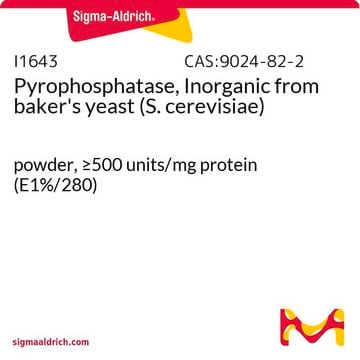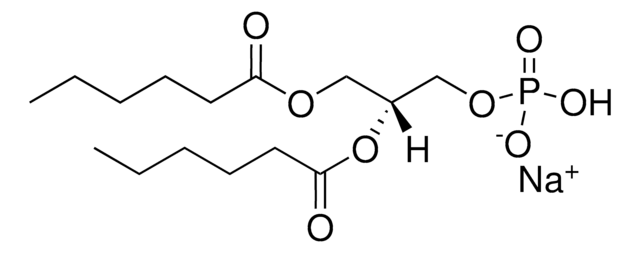추천 제품
생물학적 소스
Escherichia coli
Quality Level
재조합
expressed in E. coli
Grade
for molecular biology
설명
Recombinant, expressed in E.coli
분석
≥95% (size exclusion chromatography)
양식
buffered aqueous solution
특이 활성도
≥100 units/mL
유통기한
2 yr at -20 °C ((retest))
분자량
19.7 kDa
저장 조건
OK to freeze
농도
≥100 units/mL
색상
colorless
최적 pH
9.0 (25 °C)
pH
8.0 (25 °C)
solubility
soluble
water: miscible
적합성
suitable for molecular biology
UniProt 수납 번호
응용 분야
research use
외래 활성
DNAse, none detected
RNAse, none detected
Nickase, none detected
배송 상태
dry ice
저장 온도
-10 to -25°C
일반 설명
Inorganic pyrophosphatase (PPase) is a ubiquitous enzyme that catalyzes pyrophosphate hydrolysis. It plays an important role in energy metabolism by providing a thermodynamic pull for biosynthetic reactions, such as protein, RNA, and DNA synthesis. Nucleic acid synthesis would be energetically impossible in vivo if not coupled with the hydrolysis of pyrophosphate (PPi).
애플리케이션
This product is based on the native pyrophosphatase from E. coli, Uniprot No. P0A7A9. Pyrophosphatase in E. coli is a homohexameric protein containing 175 amino acids residues per subunit. This product is a recombinant protein expressed in E. coli and induced by IPTG. Each subunit has a MW of 19.7 kDa and theoretical pI of ~5. The protein activity is Mg2+ dependent and it is a relatively thermostable protein.
생화학적/생리학적 작용
Inorganic pyrophosphatase (PPase) is a ubiquitous enzyme that catalyzes pyrophosphate to phosphate. It plays an important role in energy metabolism as it provides a thermodynamic pull for biosynthetic reactions, such as protein, RNA, and DNA synthesis.
특징 및 장점
This product has a purity minimum of 95% (SEC-HPLC) and an activity minimum of 100 units/mL to enhance RNA yield during transcription.
단위 정의
One unit will release 1.0 µmole of inorganic orthophosphate per minute at pH 9 at 25 °C. The reaction buffer used for determination of enzyme activity contains 50 mM Tris-HCl, pH 9.0.
물리적 형태
The product is supplied as an aqueous solution containing 20mM Tris-HCl, 100mM NaCl, 1mM DTT, 0.1mM EDTA, and 50% glycerol, titrated to pH 8 at 25 °C.
Storage Class Code
10 - Combustible liquids
WGK
WGK 1
가장 최신 버전 중 하나를 선택하세요:
시험 성적서(COA)
Lot/Batch Number
R Lahti et al.
Journal of bacteriology, 170(12), 5901-5907 (1988-12-01)
Escherichia coli K-12 gene ppa encoding inorganic pyrophosphatase (PPase) was cloned and sequenced. The 5' end of the ppa mRNA was identified by primer extension mapping. A typical E. coli sigma 70 promoter was identified immediately upstream of the mRNA
B S Cooperman et al.
Trends in biochemical sciences, 17(7), 262-266 (1992-07-01)
Soluble inorganic pyrophosphatases (PPases) are essential enzymes that are important for controlling the cellular levels of inorganic pyrophosphate (PPi). Although prokaryotic and eukaryotic PPases differ substantially in amino acid sequence, recent evidence now demonstrates clearly that PPases throughout evolution show
A A Baykov et al.
Biochemistry, 35(15), 4655-4661 (1996-04-16)
Steady-state rates of PPi hydrolysis by Escherichia coli inorganic pyrophosphatase (E-PPase) were measured as a function of magnesium pyrophosphatase (substrate) and free Mg2+ ion (activator) in the pH range 6.0-10.0. Computer fitting of hydrolysis data in combination with direct measures
Kyung Min Ko et al.
FEBS letters, 581(28), 5445-5453 (2007-11-06)
Inorganic pyrophosphatase (PPase) catalyzes the hydrolysis of inorganic pyrophosphate (PPi) into phosphate (Pi), which provides a thermodynamic driving force for important biosynthetic reactions. The nematode Caenorhabditis elegans gene C47E12.4 encodes a PPase (PYP-1) which shows 54% amino acid identity with
A Salminen et al.
The Journal of biological chemistry, 274(48), 33898-33904 (1999-11-24)
A homohexameric molecule of Escherichia coli pyrophosphatase is arranged as a dimer of trimers, with an active site present in each of its six monomers. Earlier we reported that substitution of His(136) and His(140) in the intertrimeric subunit interface splits
자사의 과학자팀은 생명 과학, 재료 과학, 화학 합성, 크로마토그래피, 분석 및 기타 많은 영역을 포함한 모든 과학 분야에 경험이 있습니다..
고객지원팀으로 연락바랍니다.







